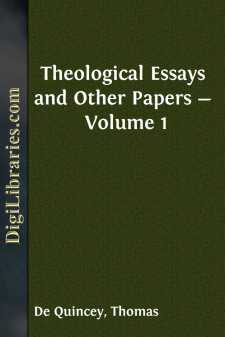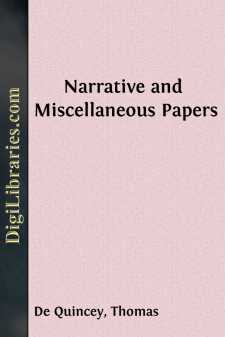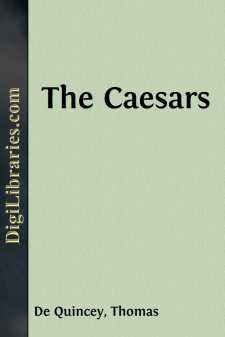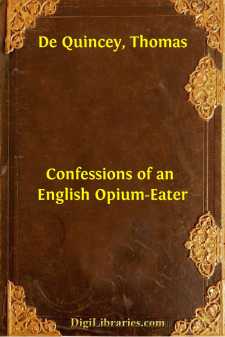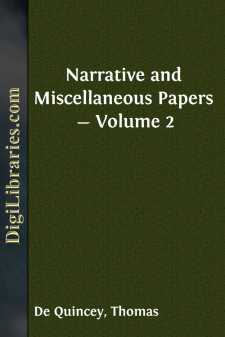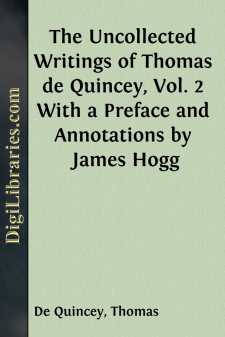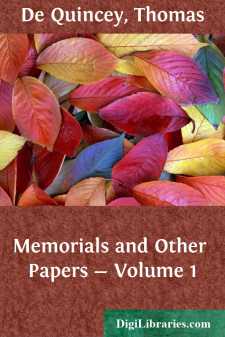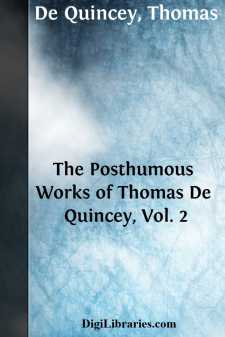Categories
- Antiques & Collectibles 13
- Architecture 36
- Art 48
- Bibles 22
- Biography & Autobiography 813
- Body, Mind & Spirit 142
- Business & Economics 28
- Children's Books 17
- Children's Fiction 14
- Computers 4
- Cooking 94
- Crafts & Hobbies 4
- Drama 346
- Education 46
- Family & Relationships 57
- Fiction 11829
- Games 19
- Gardening 17
- Health & Fitness 34
- History 1377
- House & Home 1
- Humor 147
- Juvenile Fiction 1873
- Juvenile Nonfiction 202
- Language Arts & Disciplines 88
- Law 16
- Literary Collections 686
- Literary Criticism 179
- Mathematics 13
- Medical 41
- Music 40
- Nature 179
- Non-Classifiable 1768
- Performing Arts 7
- Periodicals 1453
- Philosophy 64
- Photography 2
- Poetry 896
- Political Science 203
- Psychology 42
- Reference 154
- Religion 513
- Science 126
- Self-Help 84
- Social Science 81
- Sports & Recreation 34
- Study Aids 3
- Technology & Engineering 59
- Transportation 23
- Travel 463
- True Crime 29
Thomas De Quincey
Thomas De Quincey (1785-1859) was an English essayist best known for his autobiographical work, "Confessions of an English Opium-Eater," which explores his experiences with opium addiction and its impact on his life and work. A key figure in the Romantic movement, De Quincey's writings combine rich, lyrical prose with keen psychological insight. His contributions to literature also include critical essays and works on philosophy and political economy, influencing both his contemporaries and later writers.
Author's Books:
Sort by:
ON CHRISTIANITY, AS AN ORGAN OF POLITICAL MOVEMENT. [1846.] FORCES, which are illimitable in their compass of effect, are often, for the same reason, obscure and untraceable in the steps of their movement. Growth, for instance, animal or vegetable, what eye can arrest its eternal increments? The hour-hand of a watch, who can detect the separate fluxions of its advance? Judging by the past, and the...
more...
THE HOUSEHOLD WRECK. 'To be weak,' we need not the great archangel's voice to tell us, 'is to be miserable.' All weakness is suffering and humiliation, no matter for its mode or its subject. Beyond all other weakness, therefore, and by a sad prerogative, as more miserable than what is most miserable in all, that capital weakness of man which regards the tenure of his enjoyments...
more...
THE CÆSARS. The condition of the Roman Emperors has never yet been fully appreciated; nor has it been sufficiently perceived in what respects it was absolutely unique. There was but one Rome: no other city, as we are satisfied by the collation of many facts, either of ancient or modern times, has ever rivalled this astonishing metropolis in the grandeur of magnitude; and not many—if we except the...
more...
I here present you, courteous reader, with the record of a remarkable period in my life: according to my application of it, I trust that it will prove not merely an interesting record, but in a considerable degree useful and instructive. In that hope it is that I have drawn it up; and that must be my apology for breaking through that delicate and honourable reserve which, for the most part, restrains...
more...
Some years ago, some person or other, [in fact I believe it was myself,] published a paper from the German of Kant, on a very interesting question, viz., the age of our own little Earth. Those who have never seen that paper, a class of unfortunate people whom I suspect to form rather the majority in our present perverse generation, will be likely to misconceive its object. Kant's purpose was, not...
more...
INTRODUCTION I. LIFE Thomas de Quincey was born in Manchester on the 15th of August, 1785. His father was a man of high character and great taste for literature as well as a successful man of business; he died, most unfortunately, when Thomas was quite young. Very soon after our author's birth the family removed to The Farm, and later to Greenhay, a larger country place near Manchester. In 1796 De...
more...
THE ENGLISH IN CHINA. This Paper, originally written for me in 1857, and published in Titan for July of that year, has not appeared in any collective edition of the author's works, British or American. It was his closing contribution to a series of three articles concerning Chinese affairs; prepared when our troubles with that Empire seemed to render war imminent. The first two were given in Titan...
more...
VISIT TO LAXTON. My route, after parting from Lord Westport at Birmingham, lay, as I have mentioned in the "Autobiographic Sketches," through Stamford to Laxton, the Northamptonshire seat of Lord Carbery. From Stamford, which I had reached by some intolerable old coach, such as in those days too commonly abused the patience and long-suffering of Young England, I took a post-chaise to Laxton....
more...
Many of the papers in my collected works were originally written under one set of disadvantages, and are now revised under another. They were written generally under great pressure as to time, in order to catch the critical periods of monthly journals; written oftentimes at a distance from the press (so as to have no opportunity for correction); and always written at a distance from libraries, so that...
more...
INTRODUCTION. All that needs to be said in the way of introduction to this volume will best take the form of notes on the articles which it contains. I. 'Conversation and S. T. Coleridge.' This article, which was found in a tolerably complete condition, may be regarded as an attempt to deal with the subject in a more critical and searching, and at the same time more sympathetic and inclusive...
more...


